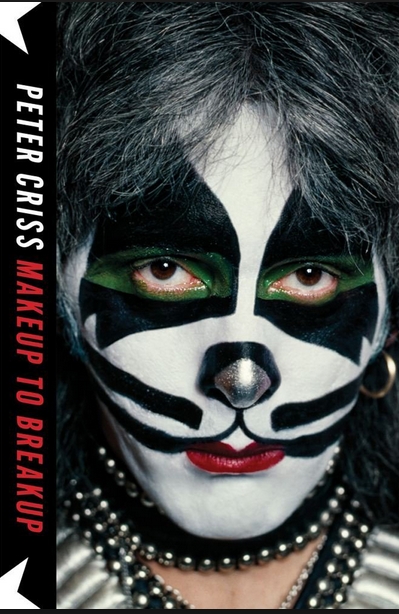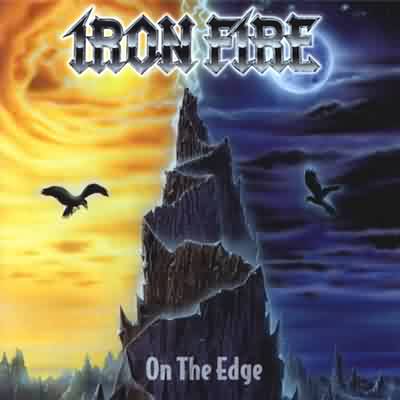 Filed under the bookstore section called “Lifestyles of the Rich and Blameless”, this is the KISS drummer’s attempt to set the record crooked. The KISS breakup soap opera has no shortage of pointing fingers, but Peter Criss adds all eight of his own, plus two (non-opposable?) pointing thumbs, and a pointing toe. Gene’s an asshole, Paul’s an asshole, Ace is an asshole, his grandma’s an asshole, the IRS together comprises an asshole…nothing’s ever Criss’s fault, is it? At its best, the book is revealing and honest. Sometimes it’s shallow and manipulative, 384 pages of PR management. And it was ghost-written, which adds another obfuscating layer between the reader and the truth.
Filed under the bookstore section called “Lifestyles of the Rich and Blameless”, this is the KISS drummer’s attempt to set the record crooked. The KISS breakup soap opera has no shortage of pointing fingers, but Peter Criss adds all eight of his own, plus two (non-opposable?) pointing thumbs, and a pointing toe. Gene’s an asshole, Paul’s an asshole, Ace is an asshole, his grandma’s an asshole, the IRS together comprises an asshole…nothing’s ever Criss’s fault, is it? At its best, the book is revealing and honest. Sometimes it’s shallow and manipulative, 384 pages of PR management. And it was ghost-written, which adds another obfuscating layer between the reader and the truth.
It opens in 1994. Criss is in a filthy bedroom in LA, down to his last hundred thousand dollars, and getting ready to shoot himself. The barrel of the gun is in his mouth when he looks at a picture of his daughter, and he hears God telling him not to do it. The scene is overcooked and not entirely convincing. Then we go back to the beginning, when a young man called Peter Criscoula joined a band called Wicked Lester, which changed its name to KISS, recruiting Bill Aucoin, and emerged as the hottest act in rock (figuratively and otherwise. The time when Gene Simmons set himself on fire is described with some glee)
There’s some big laughs in this part of the book: like when the band discovered that their live show had finally received a positive review…from a gay lifestyle magazine. But ultimately you can’t say that Peter “Catman” Criss ever fell out of character, for Makeup to Breakup is indeed catty: proof of this comes early in the book, where he slams Paul and Gene for their “revisionist KISStory”. This is the start of a lot of ripping on his erstwhile bandmates, which starts out funny and then becomes less so.
Makeup to Breakup is certified masturbatory material if you hate “Gaul Stimmons” (Paul is described as semi-gay, with a fixation for men’s dicks. Gene is presented as a power-tripping megalomaniac who belongs in a room with padded walls), but for heaven’s sake, at least those guys wrote music. What did Criss ever do? “Beth”? That was someone else’s song. He didn’t vibe with the band musically (he recalls hearing a tape from Wicked Lester and thinking it was too heavy for his taste), and his personality clashed with everyone. Add in his well-documented substance issues and you have a hors de combat member of the KISS Army.
Criss’s problem is that he was boring – and that is the one thing rock stars can never be. They can suck at their instruments. They can be narcissists and egomaniacs. They can be brazen criminals. But they can not be boring. Criss was smaller than life, the dullest member of the band, possessed of a fragile, neotenous face and quintessentially inadequate drumming skills. His career highlight was really someone else’s highlight. He even had the most boring character.
Criss wasn’t a rock star, he was more of a rock meteor…a brief flash in the night sky, and then an anticlimactic cooling lump displayed in a museum for the next forty years. Say what you will about Gene and Paul, but THEY are KISS. All Peter Criss did was keep the drummer’s stool warm for a while, and this memoir exposes it totally.
No Comments »
 80% of heavy metal is played by after-hours Burger King workers with lyrics that are about killing people and worshiping the devil. It’s not exactly high-class entertainment, and you’d think more metal fans would have a sense of humor. However, they tend to be insecure crybabies, and this album illuminated that fact with an atom bomb blast.
80% of heavy metal is played by after-hours Burger King workers with lyrics that are about killing people and worshiping the devil. It’s not exactly high-class entertainment, and you’d think more metal fans would have a sense of humor. However, they tend to be insecure crybabies, and this album illuminated that fact with an atom bomb blast.
Iron Fire is a power metal band that arrived in 2000 with Thunderstorm, a Hammerfall ripoff that possessed energy and passion (things the actual Hammerfall has not had in years) but little creativity. Their second album, On the Edge, was frontman Martin Steene’s effort at fixing that by adding Motley Crue vocals, progressive song structures, and various other things. The results were dismal sales, countless lost fans, and the termination of a record deal.
The band is too obscure for the album to be a notorious flop, but a listen reveals a sadly overlooked and misunderstood album that could have been the cure for power metal’s current diseases. I would rather hear this sort of thing than the new Edguy, Helloween, or Sonata Arctica albums – “experimental” though it is. Derided and maligned, this album is the power metal Rudolph the Red Nosed Reindeer (but as Neil Degrasse Tyson pointed out, if Rudolph’s nose is shiny then it’s probably just reflecting light, not emitting it – useless for navigating fog.)
If you don’t want to listen to the whole thing, stay with the program just for tracks 1-7. The band is just on fire in these six songs and one prelude, with huge hooks, addictive melodies, and Tommy Hansen’s superb production – each of “The End of it All’s” kick drum hits strikes your ear like a spitball of perfectly compressed air. “Into the Abyss” lurches from downtempo sludge to uptempo thrashing like a Panzer tank changing gears, and “On the Edge” brings lots of agitation and vocal histrionics, accentuated by some death metal vocals.
But the greatest song of all is “Thunderspirit”, an amazing shockwave of high-speed energy driven by Morten Plenge’s lightning-fast drumming and maybe Martin Steene’s best vocal performance ever. The cannon-fire in the bridge was a nice touch.
Two songs are total bombs. “Wanted Man”…Stop it with this cat crap, Steene. The only place where you’re a wanted man is in the local gay bar for the 345345987 male escorts you forgot to pay. “The Price of Blood” is not as irritating but instead is far more boring – nothing to grab on to here except dry rock riffs and some goofy vocal effects.
But out of all the Iron Fire releases, this is the one that interests me the most. It’s unified, it’s catchy, it has an impressively low number of filler songs, and it’s not overly muddy or dark-sounding like their newer efforts. Definitely underrated, and worth seeking out. Heavy metal can suck, but you don’t have to.
No Comments »
 I cannot find the direct quote, but Haruki Murakami’s translator said something to the effect that you should never learn a second language, because it will make you realise how much your favorite foreign-language books were corrupted in the translation. I don’t think this would be much of an issue with Borges’ writing. There’s a timelessness about his stories, as if they’re not constructed from fragments and morphemes but from ideas. So long as a language recognizes the basic building blocks of logic, Borges’ tales can be translated to and read it in.
I cannot find the direct quote, but Haruki Murakami’s translator said something to the effect that you should never learn a second language, because it will make you realise how much your favorite foreign-language books were corrupted in the translation. I don’t think this would be much of an issue with Borges’ writing. There’s a timelessness about his stories, as if they’re not constructed from fragments and morphemes but from ideas. So long as a language recognizes the basic building blocks of logic, Borges’ tales can be translated to and read it in.
This book collects most or all of Borges’ “fiction”. This makes for a varied read, but varied is the rubric of everything Borges’ wrote. This collection is everything at once, all the time. Alternate history runs into proto-Ballardian speculative fiction, which bows out for poetry and fantasy and essays. Erase the front and back cover and this could be an anthology by at least five separate authors.
The first section is A Universal History of Infamy – tales of swashbuckling and adventure that blend history and mythology in the same way as…actual history. These stories are thematically shallow but action-packed and exciting. Borges apparently didn’t think much of this book, but what did he know?
Then we get to the the two legendary collections – Ficciones and The Aleph. What can I say about them? Try to understand them and you will only get part of the truth. Try to describe them and they will sound distorted and ruined on your tongue. Try to imitate them and you will fail. This is partly because of Borges inimitable style – direct, yet coy – but it’s mostly because these stories are about things truly beyond human comprehension. The human figures in his stories seem dwarfed, like ants gathering food in the shade of the Colossus. Even the stories that don’t invoke mathematical infinity have a larger-than-life quality about them, such as the haunting “Tlön, Uqbar, Orbis Tertius”, which evokes similar feelings of cosmic dislocation as Mark Danielewski’s House of Leaves, and more gracefully too.
The tales from The Maker are slightly less ambitious but are entertaining and thought provoking. There’s “Borges and I”, probably the only story I’ve read that’s in the both the first and second person simultaneously, and “Toenails”, a disturbing musing on one’s body parts. It’s the sort of thing that might have appeared on Jorge Luis Borges’ blog, had such a thing been possible.
There were better writers of philosophy (numberless), better writers of fantasy (a lot), better writers of horror (a few), and better writers of speculation fiction (one or two), but nobody else was a jack of this many trades. He was even a master of pithy quotes (“a fight between two bald men over a comb” – on the Falklands conflict). Almost everything in this collection is entertaining, and everything is the operational word here. Other writers are like tiles in a floor. Borges is the cement poured between the tiles – connecting everything, joining all. Now come, membership at the Library of Babel awaits.
No Comments »
 Filed under the bookstore section called “Lifestyles of the Rich and Blameless”, this is the KISS drummer’s attempt to set the record crooked. The KISS breakup soap opera has no shortage of pointing fingers, but Peter Criss adds all eight of his own, plus two (non-opposable?) pointing thumbs, and a pointing toe. Gene’s an asshole, Paul’s an asshole, Ace is an asshole, his grandma’s an asshole, the IRS together comprises an asshole…nothing’s ever Criss’s fault, is it? At its best, the book is revealing and honest. Sometimes it’s shallow and manipulative, 384 pages of PR management. And it was ghost-written, which adds another obfuscating layer between the reader and the truth.
Filed under the bookstore section called “Lifestyles of the Rich and Blameless”, this is the KISS drummer’s attempt to set the record crooked. The KISS breakup soap opera has no shortage of pointing fingers, but Peter Criss adds all eight of his own, plus two (non-opposable?) pointing thumbs, and a pointing toe. Gene’s an asshole, Paul’s an asshole, Ace is an asshole, his grandma’s an asshole, the IRS together comprises an asshole…nothing’s ever Criss’s fault, is it? At its best, the book is revealing and honest. Sometimes it’s shallow and manipulative, 384 pages of PR management. And it was ghost-written, which adds another obfuscating layer between the reader and the truth. 

